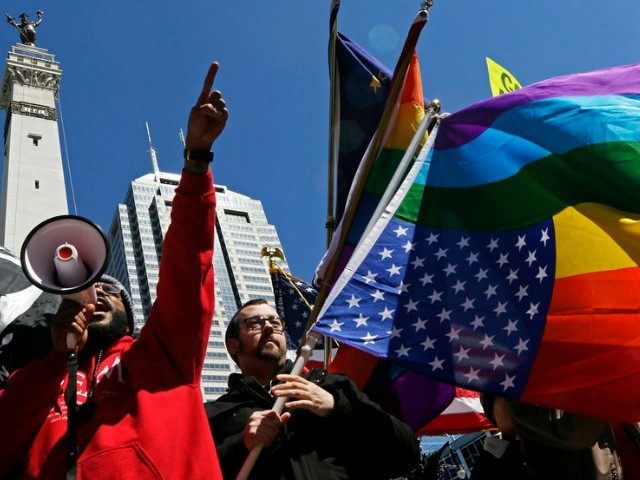Indianapolis, the focal point of national news this week, becomes the center of the sports universe this weekend.
Lucas Oil Stadium hosts college basketball’s Final Four, which, because of Indiana Governor Mike Pence signing the Religious Freedom Restoration Act (RFRA) last week, brings fans as well as protestors to the Midwestern metropolis.
“I hope Indianapolis enjoys hosting this big event this weekend,” Will Leitch vindictively writes. “Because it won’t happen again for a long, long time.”
Get it? We won’t persuade those hayseeds. We will punish them.
The Deadspin founder isn’t the only bully ordering sports leagues to take their ball and go home.
Inside NBA Basketball analyst Charles Barkley and ESPN late-night host Keith Olbermann demand that the Indiana-based NCAA—on a few days’ notice no less—reconvene the Final Four outside of the Hoosier State. USC athletic director Pat Haden cites his gay son as a reason for boycotting the College Football Playoff meeting in Indianapolis this week. “And strictly from a business sense,” George Diaz writes at the Orlando Sentinel, “you think Indy has a shot at hosting another Super Bowl in a state that embraces discrimination disguised as ‘religious freedom’?”
Don’t tell Diaz but he writes from a state that, like Indiana, boasts an RFRA law on its books without a nondiscrimination statute giving special protected status to gays and lesbians. Other journalists sharing Mr. Diaz’s outlook but not his ignorance acknowledge Indiana standing with many other states rather than alone on this. But they invariably offer caveats and codicils explaining why we should ignore that Bill Clinton signed essentially the same bill into law as president and that Barack Obama voted for essentially the same bill in the Illinois state senate.
It’s a Two Minutes Hate, which doesn’t allow time for much thought amid the frenzy.
Political correctness doesn’t argue. It socializes. “We live in a time when reality is in conflict with platitude, when a fact is in conflict with an a priori interpretation of it, when common sense is in conflict with a distorted rationality,” Vaclav Havel wrote in another place, another age. He’s dead but his words live. “On Evasive Thinking” describes our time and location, the disconnect between what we think and what we say. Through peer pressure, shaming, and intimidation, political correctness forces us to pretend that lies are true and that we agree with what we disagree. Like an evangelical Christian demanding that a gay baker provide the edible delights for his event promising conversion therapy for homosexuals, political correctness violates conscience.
In its self-righteousness, it also rides roughshod over democracy. Outraged boos greeted a democratically-elected legislature and governor when they codified a religious freedom bill (Indiana). Gushing applause greeted the four judges who imposed a gay marriage law on six million people denied a vote on the matter (Massachusetts).
This is what democracy looks like?
Nobody boycotted Fenway Park or Beanpot hockey or the Boston Marathon because four robed dictators transformed one of the oldest functioning democracies on the planet into an oligarchy on the question of same-sex marriage. Eleven years later, loud voices in the sports media characterize Indiana’s exercise in self-government as an affront to democracy rectified by removing the Big Ten championship football game, the NCAA Final Four, and any future Super Bowl from Indianapolis. Surely one’s right to vote at least equals the inalienable “right” to hire an evangelical Christian to photograph a gay wedding.
The crusade to kill the law ironically mirrors the crusaders’ vision of life without the law. Means and end unite in silencing disapproved speech and by compelling individual actions that clash with individual beliefs. In sports overflowing with Christians, the voices we hear on this controversy come almost exclusively from partisans of gay rights trumping religious rights. The debate, such as a monologue can be called that, silences people of faith. Repealing such laws goes beyond silencing religious people. It would compel them to violate the very tenets of their conscience.
In four of the next seven years, the NCAA’s Final Four takes place in states where one finds an RFRA law on the books. Maybe when Texas gets the Indiana treatment next year, and Arizona gets it the following year, the campaign to ostracize will lose steam as the mob realizes that, like Spartacus, there are many Indianas. They just don’t announce “I am Indiana” very loudly or very clearly.
Can you blame them?

COMMENTS
Please let us know if you're having issues with commenting.